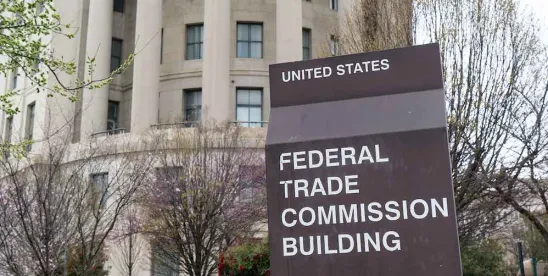On Tuesday, 23 April 2024, the Federal Trade Commission (FTC or Commission) hosted a Special Open Commission Meeting, in which the Commissioners voted 3-2 to publish and issue a Final Rule that:
- bans for-profit employers from entering into agreements with workers that impose a restriction on their ability to compete with the employer (Non-Competes) on or after the Final Rule’s effective date; and
- prevents employers from enforcing existing Non-Competes against most workers.
The Final Rule does allow existing Non-Competes with senior executives1 to remain in effect but requires employers to notify any nonsenior executives2 that an existing Non-Compete entered into prior to the effective date of the Final Rule is no longer enforceable. The FTC first published its proposed rule banning Non-Competes in January 2023 (Proposed Rule),3 after which it received and reviewed a reported 26,000 comments from the public. The Final Rule differs in a few key respects from the Proposed Rule, which are explained below.
The Final Rule will go into effect within 120 days of publication in the Federal Register, unless enjoined by the courts. That said, the Final Rule is already being challenged on constitutional grounds,4 and thus may not go into effect unless and until it withstands those legal challenges, which we anticipate could be heard by the US Supreme Court. The Final Rule is significant because it is the first federal level ban against Non-Competes and would have a significant impact on the US labor market if it withstands legal challenge and goes into effect. The Final Rule follows increased state-level activity limiting the use and scope of Non-Competes, as well as efforts by other federal agencies focused on the perceived inequitable bargaining power between employees and employers.5
FINAL RULE BANNING NON-COMPETES
The Final Rule broadly prohibits employers from imposing and enforcing Non-Competes on most workers subject to the FTC’s jurisdiction as discussed below. As anticipated, the Final Rule extends to any worker without regard to the worker’s title, including, but not limited to, employees, independent contractors, and interns. A Non-Compete is also defined broadly, now encompassing any oral or written term or condition of employment that functions to prevent a worker from seeking or accepting work or operating a business in the United States after the conclusion of employment. While the definition of Non-Compete does not explicitly reference nonsolicitation agreements, if such agreements were overbroad and functionally prevented an employee from performing services following termination of employment, they would be designated as a Non-Compete under the Final Rule. However, A Non-Compete does not include restrictive covenants that bar competition during employment, such as anti-moonlighting policies.
While the Final Rule closely tracks the Proposed Rule, there are a few key differences. First, the Final Rule creates a broader exemption for Non-Competes used in the sale of business context by removing the substantial ownership requirement and extending the exception to any bona fide sale of business transaction. Further, while employers may not enter into or enforce new Non-Competes with senior executives under the Final Rule, they may enforce existing Non-Competes against them. Finally, the Final Rule does not apply to any causes of actions involving Non-Competes pending prior to the effective date.
JURISDICTIONAL LIMITS TO THE FINAL RULE
The Commission issued the Final Rule pursuant to Sections 5 and 6(g) of the Federal Trade Commission Act (FTC Act). The FTC Act only applies to an entity “organized to carry on business for its own profit or that of its members.”6 While that language appears to exempt any entity that claims a not-for-profit status, the comments to the Final Rule explicitly warn that merely claiming tax-exempt status under the Internal Revenue Code is not sufficient to exempt an organization from the FTC Act. More specifically, the Commission applies a two part test to determine whether a corporation is organized for profit within the Commission’s jurisdiction, evaluating both (1) whether an organization is engaged in business for a charitable purpose, and (2) whether the organization or its members derive a profit. During the Commission’s open meeting on the Final Rule, Commissioners Slaughter and Bedoya discussed the high number of comments received from healthcare industry employees and warned that not-for-profit healthcare entities that derive a profit from their business are subject to the FTC Act, and consequently to the Final Rule. However, these same Commissioners acknowledged that the FTC Act does not have jurisdiction over bona fide not-for-profit entities. Thus, it remains to be seen how courts will apply the Final Rule to certain not-for-profit entities.
LEGAL CHALLENGES TO THE FINAL RULE
At the time of publication, the Final Rule is already facing legal challenges from the business community. Just hours after the Final Rule was revealed, a tax services firm sued the FTC in the Northern District of Texas, alleging that the Final Rule violates the Administrative Procedure Act. Likewise, the US Chamber of Commerce, along with other business associations, filed suit for declaratory and injunctive relief in the Eastern District of Texas. Based on the comments from the dissenting Commissioners as to the FTC’s jurisdictional ability to issue such a regulation, it is unsurprising that the Final Rule has been challenged so quickly. While the dissenters did not wholesale endorse the use of Non-Competes for workers, both were in agreement that the FTC Act did not vest such broad rulemaking authority in the FTC, but that such power instead lies with Congress.
LOOKING AHEAD
Employers should review their anticipated obligations under the Final Rule, but should also monitor the status of the Final Rule and current and anticipated challenges to it in the coming weeks and months.
FOOTNOTES
1 The Final Rule defines “Senior Executives” as those workers in a policy-making position; and receiving total annual compensation of at least US$151,164 in the preceding year or on an annualized basis. The newly included threshold for these workers is aligned with that of a highly compensated employee under the US Department of Labor’s final rule issued on 23 April 2024 setting the new salary thresholds for exempt workers under the Fair Labor Standards Act.
2 According to the Final Rule, a senior executive is a worker possessing “final authority to make policy decisions that control significant aspects of a business entity or common enterprise.” What it means to make policy decisions is sure to be developed as litigation of this rule ensues.
3 See K&L Gates Legal Alert, Lauren Norris Donahue, et. al, FTC Proposes Sweeping Ban on Employee Noncompete Clauses: What Employers Need to Know, Proposed Alternatives, and Opportunity for Public Comment (January 6, 2023), available at https://natlawreview.com/article/ftc-proposes-sweeping-ban-employee-noncompete-clauses-what-employers-need-to-know.
4 As of the publication of this alert, two lawsuits have been filed against the FTC challenging the Final Rule under the Administrative Procedure Act.
5 See K&L Gates Legal Alert, Michael A. Pavlick, Erinn L. Rigney and Taylor J. Arluck, NLRB General Counsel Seeks to Outlaw Most Noncompetition Agreements (May 31, 2023), available at https://natlawreview.com/article/nlrb-general-counsel-issues-compliance-guidance-recent-ruling-limiting-severance.
6 15 U.S.C. 44.







 />i
/>i

